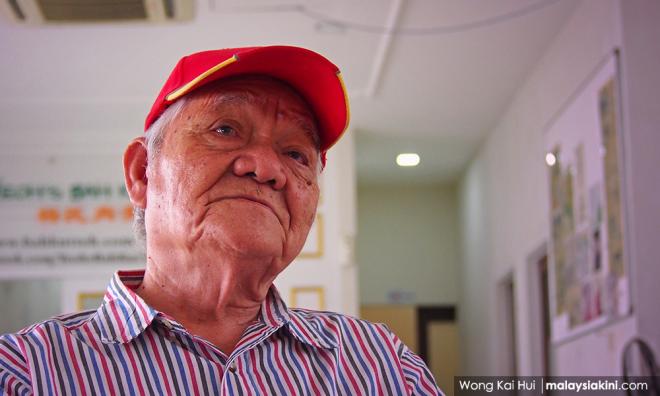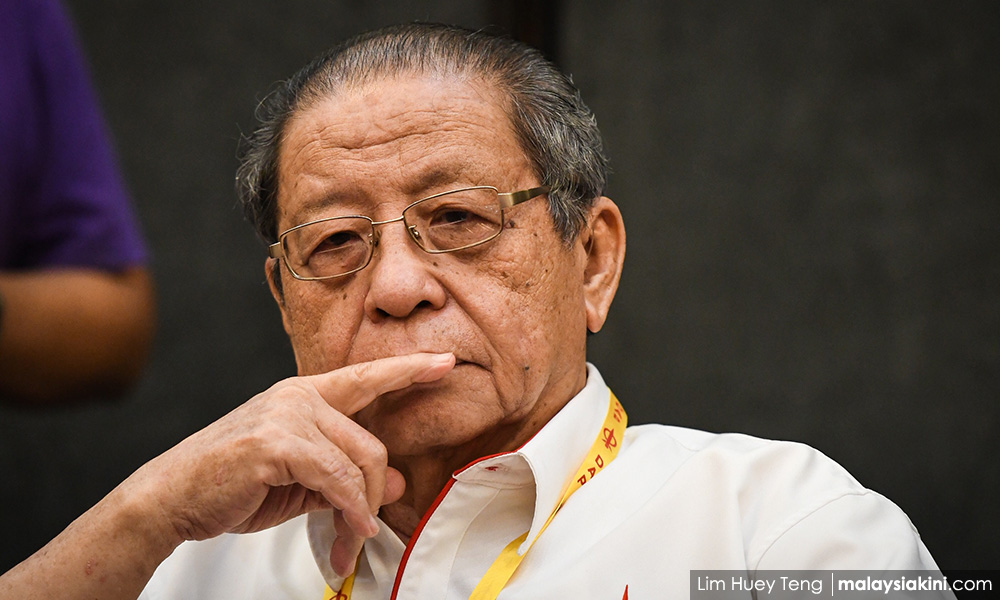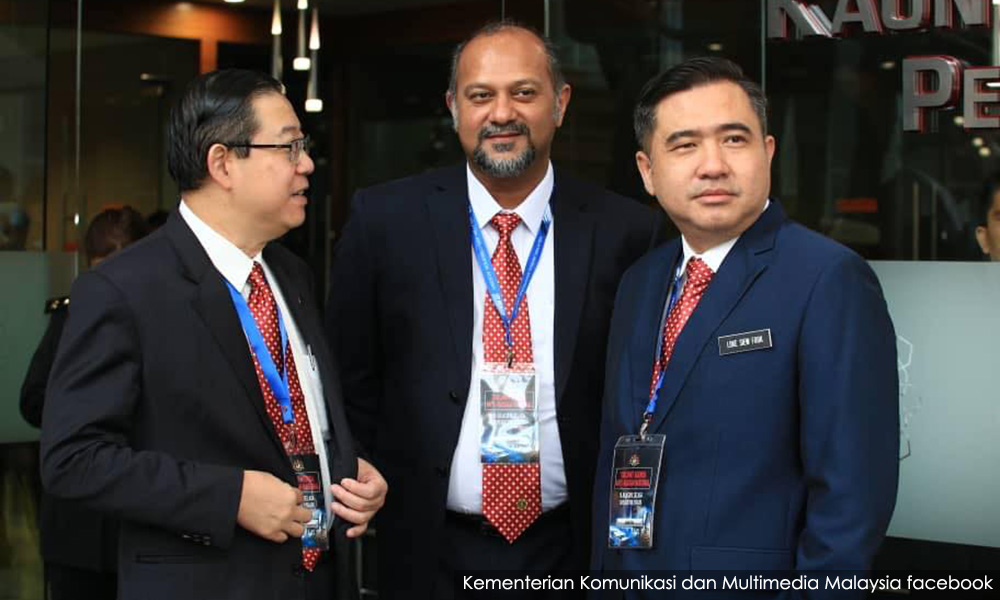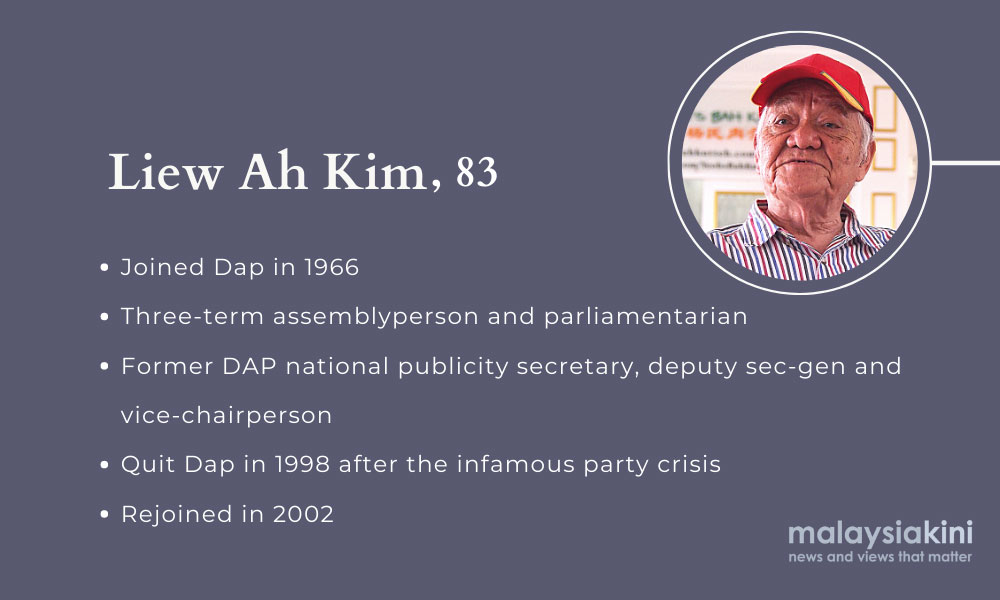
Octogenarian says his comeback is to push for democratic reform in DAP
Two decades after turning his back on active politics, Liew Ah Kim, 83, has decided to contest in the DAP election for a central executive committee (CEC) post, which is expected to be held before June this year.
In an interview with Malaysiakini, the former MP stressed that he does not intend to bring down party leaders Lim Kit Siang and his son Guan Eng, but wanted to push for democratic reform.
According to him, the decision-making process in DAP is dominated by two or three leaders and this is not good for the party's future.
"I have never used the term 'Topple the Lims Movement'. What I am proposing is related to the democratic process and the party's operation. The party has been relying on certain personalities for too long,” he stressed.
The CEC, the party's top decision-making body, he alleged, served more like a rubber stamp.
"Often, the CEC calls for meetings after the chairperson or secretary-general announces something through the media. This is not right. I pointed this out 21 years ago.
“Every CEC member should have the power to raise their opinion and a collective decision must be reached before an announcement is made.”
Liew joined DAP in 1966, one year after the party was founded. He was elected as an assemblyperson and parliamentarian, serving three terms respectively.
The former close associate of Kit Siang also held the posts of national publicity secretary, deputy secretary-general and vice-chairperson.
In an interview with Malaysiakini, the former MP stressed that he does not intend to bring down party leaders Lim Kit Siang and his son Guan Eng, but wanted to push for democratic reform.
According to him, the decision-making process in DAP is dominated by two or three leaders and this is not good for the party's future.
"I have never used the term 'Topple the Lims Movement'. What I am proposing is related to the democratic process and the party's operation. The party has been relying on certain personalities for too long,” he stressed.
The CEC, the party's top decision-making body, he alleged, served more like a rubber stamp.
"Often, the CEC calls for meetings after the chairperson or secretary-general announces something through the media. This is not right. I pointed this out 21 years ago.
“Every CEC member should have the power to raise their opinion and a collective decision must be reached before an announcement is made.”
Liew joined DAP in 1966, one year after the party was founded. He was elected as an assemblyperson and parliamentarian, serving three terms respectively.
The former close associate of Kit Siang also held the posts of national publicity secretary, deputy secretary-general and vice-chairperson.

However, ties between Liew and Kit Siang soured during a DAP leadership crisis in the late-1990s. Subsequently, the octogenarian lost in the party polls and faded from politics.
During the interview, Liew denied he had initiated the “Kick Out Kit Siang” (KOKS) movement in 1998. He also claimed that his decision to make a comeback was not motivated by any vendetta.
“I have let go of the past. I was wrongly accused at the time... I left DAP and rejoined later, which proves that I accepted all that had happened.
“I saw that Kit Siang and other leaders still fight for our constitutional rights and stood in the frontline. They were important leaders in the democratic movement. So I felt my personal loss did not matter, I could just retire if I am no longer a YB (elected representative).
“But since DAP was a decent party with decent leaders who were willing to stand up, I returned to the party four years after resigning,” he added.
DAP's performance in govt disappointing
However, DAP's performance as part of the ruling Pakatan Harapan government for 22 months had left Liew disappointed.
He expressed unhappiness with the party on matters such as the recognition of the United Examination Certificate (UEC), the introduction of Jawi in vernacular schools and the allocation for the Tunku Abdul Rahman University College.
The octogenarian said he felt vexed and upset when Kit Siang claimed that learning Jawi had made him "more of a Malaysian". Liew claimed this contradicted Kit Siang's position three decades ago.
"The party's problems at present are more serious than 20 years ago in terms of approach, political ideology and methods.
“What did they do during the 22 months in power? Did they follow the party's ideology? I don't think so. In many issues, they deviated from the party's past struggles," he charged.
During the interview, Liew denied he had initiated the “Kick Out Kit Siang” (KOKS) movement in 1998. He also claimed that his decision to make a comeback was not motivated by any vendetta.
“I have let go of the past. I was wrongly accused at the time... I left DAP and rejoined later, which proves that I accepted all that had happened.
“I saw that Kit Siang and other leaders still fight for our constitutional rights and stood in the frontline. They were important leaders in the democratic movement. So I felt my personal loss did not matter, I could just retire if I am no longer a YB (elected representative).
“But since DAP was a decent party with decent leaders who were willing to stand up, I returned to the party four years after resigning,” he added.
DAP's performance in govt disappointing
However, DAP's performance as part of the ruling Pakatan Harapan government for 22 months had left Liew disappointed.
He expressed unhappiness with the party on matters such as the recognition of the United Examination Certificate (UEC), the introduction of Jawi in vernacular schools and the allocation for the Tunku Abdul Rahman University College.
The octogenarian said he felt vexed and upset when Kit Siang claimed that learning Jawi had made him "more of a Malaysian". Liew claimed this contradicted Kit Siang's position three decades ago.
"The party's problems at present are more serious than 20 years ago in terms of approach, political ideology and methods.
“What did they do during the 22 months in power? Did they follow the party's ideology? I don't think so. In many issues, they deviated from the party's past struggles," he charged.

(From left) DAP leaders Lim Guan Eng, Gobind Singh Deo and Anthony Loke.
Previously, DAP organising secretary Anthony Loke was widely seen as Guan Eng's successor for the all-powerful post.
However, speculation is rife that Puchong MP Gobind Singh Deo could be the next secretary-general and this, according to observers, would prove favourable to Guan Eng as the latter would still be able to exert his influence after becoming chairperson.
Quizzed on this, Liew replied: “Possible. There are such concerns within the party.”
He said the root cause of the problem is the over-centralised decision-making process, which has not improved in the decades under both Guan Eng and his father.
Describing it as “collective karma”, he said the CEC is responsible for the immense power vested in the hands of the chairperson and secretary-general.
Therefore, Liew said CEC members should be able to think independently and express different views instead of being "yes-men".
"Every CEC member should have their own opinion and (make their own) judgement. Their wisdom is important. If you always echo (what is said), always say 'yes', then they (chairperson and secretary-general) will have great power.
"If you (CEC members) know how to oppose and if many say 'no', then the secretary-general and chairperson will have to listen to them."
Liew emphasised that the mechanism for selecting election candidates must also be reformed to improve internal democracy and the expression of dissenting views.
"We should respect the grassroots. The candidates should be selected by branch leaders before submitting to the divisions and then the state leadership. After that, the central working committee (CWC) makes the final decision.
"What is the use of being a university graduate or a lawyer? If I don't field you (as a candidate), do you have a chance (to be elected)?"
Noting that DAP has no shortage of talent, he said as long as collective leadership and responsibility is exercised, the party would continue to remain strong in future.
However, speculation is rife that Puchong MP Gobind Singh Deo could be the next secretary-general and this, according to observers, would prove favourable to Guan Eng as the latter would still be able to exert his influence after becoming chairperson.
Quizzed on this, Liew replied: “Possible. There are such concerns within the party.”
He said the root cause of the problem is the over-centralised decision-making process, which has not improved in the decades under both Guan Eng and his father.
Describing it as “collective karma”, he said the CEC is responsible for the immense power vested in the hands of the chairperson and secretary-general.
Therefore, Liew said CEC members should be able to think independently and express different views instead of being "yes-men".
"Every CEC member should have their own opinion and (make their own) judgement. Their wisdom is important. If you always echo (what is said), always say 'yes', then they (chairperson and secretary-general) will have great power.
"If you (CEC members) know how to oppose and if many say 'no', then the secretary-general and chairperson will have to listen to them."
Liew emphasised that the mechanism for selecting election candidates must also be reformed to improve internal democracy and the expression of dissenting views.
"We should respect the grassroots. The candidates should be selected by branch leaders before submitting to the divisions and then the state leadership. After that, the central working committee (CWC) makes the final decision.
"What is the use of being a university graduate or a lawyer? If I don't field you (as a candidate), do you have a chance (to be elected)?"
Noting that DAP has no shortage of talent, he said as long as collective leadership and responsibility is exercised, the party would continue to remain strong in future.

Responding to a question, Liew said he did not have a preferred choice for the secretary-general post but is willing to support anyone who prioritises the interest of the nation and party.
"The secretary-general must be someone who can give up his or her personal interests and serve the party and country. Whoever is prepared for this, I will support him or her. I don't care who he or she is,” he added.
Citing how Kit Siang was elected to the post at the age of 29, he said if young leaders are given the opportunity, they could prove to be capable leaders.
Contesting to send a signal
Elaborating on his decision to contest, Liew said he was convinced to do so by other party veterans.
The octogenarian is not concerned about the prospect of a defeat and said he entered the fray to send a signal to the party on the need for internal democracy and to uphold party principles.
"They (the leadership) pretend to be asleep. There are too many dissatisfied voices from the grassroots. Don't pretend to be asleep anymore, 'wake up'," he added.
Should he be elected, Liew said he would become a "minority" in the CEC but pledged to work hard to raise the concerns of the grassroots.
"Your responsibility is there if you are mandated. You need to convey their voice, although I may be a minority (in the CEC) and being a minority is very painful.
"They may ignore you, or there may be some disagreement. But all I want is to change the status quo, bring a fresh outlook, and combine the strength of the old, middle-aged and young members," he added.
Tomorrow: DAP mistook ally as enemy and enemy as partner, says party veteran
This interview was jointly conducted by Lee Way Loon and Wong Kai Hui.
"The secretary-general must be someone who can give up his or her personal interests and serve the party and country. Whoever is prepared for this, I will support him or her. I don't care who he or she is,” he added.
Citing how Kit Siang was elected to the post at the age of 29, he said if young leaders are given the opportunity, they could prove to be capable leaders.
Contesting to send a signal
Elaborating on his decision to contest, Liew said he was convinced to do so by other party veterans.
The octogenarian is not concerned about the prospect of a defeat and said he entered the fray to send a signal to the party on the need for internal democracy and to uphold party principles.
"They (the leadership) pretend to be asleep. There are too many dissatisfied voices from the grassroots. Don't pretend to be asleep anymore, 'wake up'," he added.
Should he be elected, Liew said he would become a "minority" in the CEC but pledged to work hard to raise the concerns of the grassroots.
"Your responsibility is there if you are mandated. You need to convey their voice, although I may be a minority (in the CEC) and being a minority is very painful.
"They may ignore you, or there may be some disagreement. But all I want is to change the status quo, bring a fresh outlook, and combine the strength of the old, middle-aged and young members," he added.
Tomorrow: DAP mistook ally as enemy and enemy as partner, says party veteran
This interview was jointly conducted by Lee Way Loon and Wong Kai Hui.
u r oso quiet like mouse when was a mp.
ReplyDelete